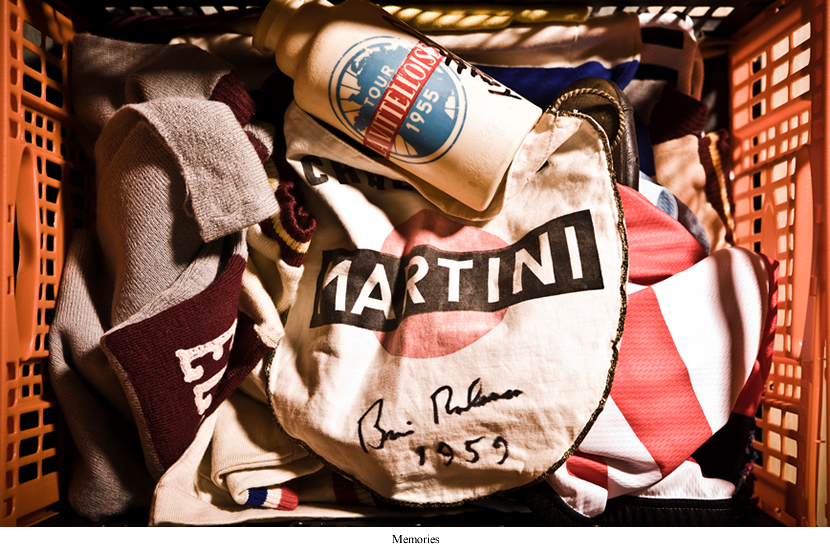Cycling Legends interviews are sponsored by:

First of the Few
With Milan-San Remo, the first monument of every year, coming up at the weekend, Chris Sidwells spoke to the first British rider to finish on the podium.
Words: Chris Sidwells
Photos: Andy Jones, Chris Auld and Cycling Legends Archive.
A lot has been written about Brian Robinson and the Tour de France. He was the first British rider ever to finish the Tour, and the first to win a stage in it. But there’s much more to this modest Yorkshire gentleman’s cycling story. I spoke to him recently about another British first he achieved, a place on the podium of one of the five great single-day races, the Monuments of Cycling, which he accomplished 61 years ago in Milan-San Remo 1957.
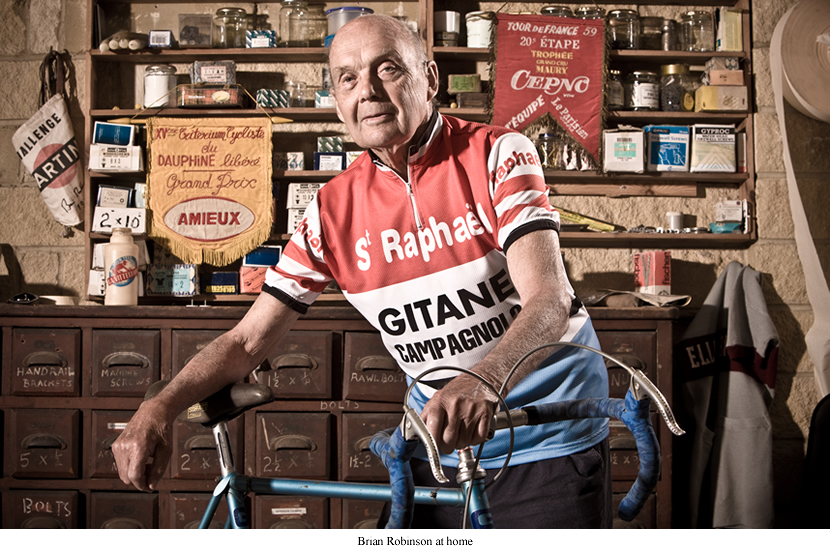
Robinson started by explaining how he got into professional cycling on the continent of Europe at a time when very few British people, other than in the two World Wars, had ever been there. “For 1955 I got offers from the two best British professional teams, BSA and Hercules, and I chose Hercules because they offered me twice the money.
“Then the way I heard it the cycling journalist Jock Wadley, the boss of Hercules and Ron White, who was a sports journalist with the Daily Express, got drunk at the 1954 world championships, although I can’t imagine Jock drunk. Anyway the three of them decided it was about time we had a British team in the Tour de France. So Hercules took us to France on January 18th 1955 to train and race and be just like the continentals, and prepare properly for the Tour de France.”
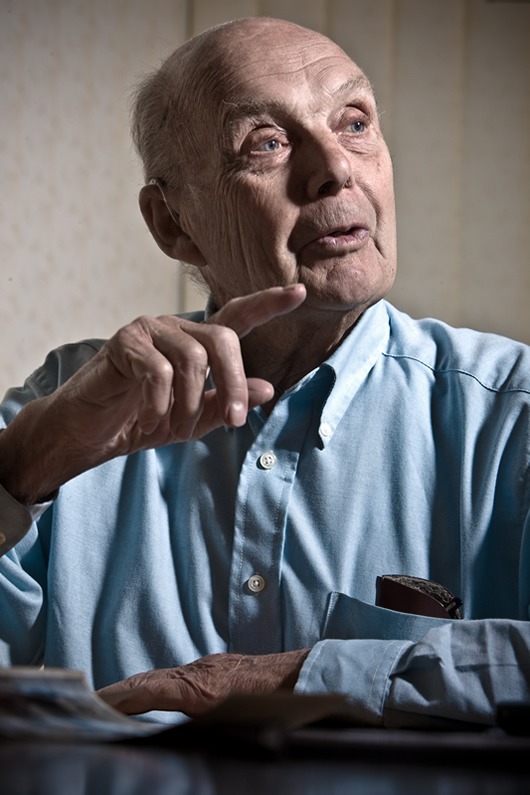 The Tour was for national and regional teams back then, but Hercules hoped that by having its riders do a European programme of big races they would form the bulk of the British team, should one get in, which wasn’t a given. While the riders got on with it, Wadley started pulling strings and calling in favours.
The Tour was for national and regional teams back then, but Hercules hoped that by having its riders do a European programme of big races they would form the bulk of the British team, should one get in, which wasn’t a given. While the riders got on with it, Wadley started pulling strings and calling in favours.Cycling heaven
Then a problem arose. Some of the Hercules riders got homesick, and they didn't like racing in all over Europe. Robinson loved it, he took to it like a duck to water, the racing and the full-time pro lifestyle was an adventure for him, something to enjoy. “It was like you were in heaven really. We stayed in bungalows on a complex at Les Issambres in the South of France. Other riders were there; Louison Bobet was next door and his brother Jean was opposite. We had a cook who shopped and prepared all our meals for us, so we were well looked after. All your salary went in the bank, it was cycling heaven.
“We’d do our day’s ride and get back by two o’clock, then it was siesta time, but instead of sleeping I’d learn a sentence of French every day. The others didn’t seem to bother about that, but I was soon able to converse with guys in the peloton.”
Speaking French helped Robinson to get accepted, and his talent did the rest. Hercules did every race they could enter because the Tour organisers, part of L’Equipe in those days, told Wadley they’d only take a British team if its riders wouldn’t be outclassed. “We had to qualify really,” Robinson says. In the end he qualified the team on his own.
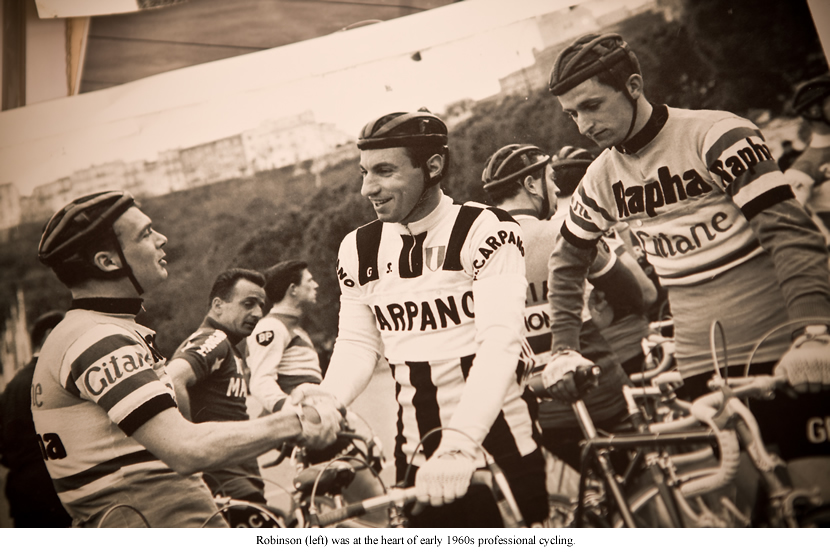
Robinson finished eighth in Paris-Nice, fourth in La Flèche Wallonne, then led the Tour of the Six Provinces for a while. The British national team was in, but it ended up with fewer Hercules riders than the bike company wanted. “A lot went home. It was understandable really, guys like Dave Bedwell had a good life for four or five years commanding races in Britain before we went to France. They didn’t manage to step up I think.”
Getting through it
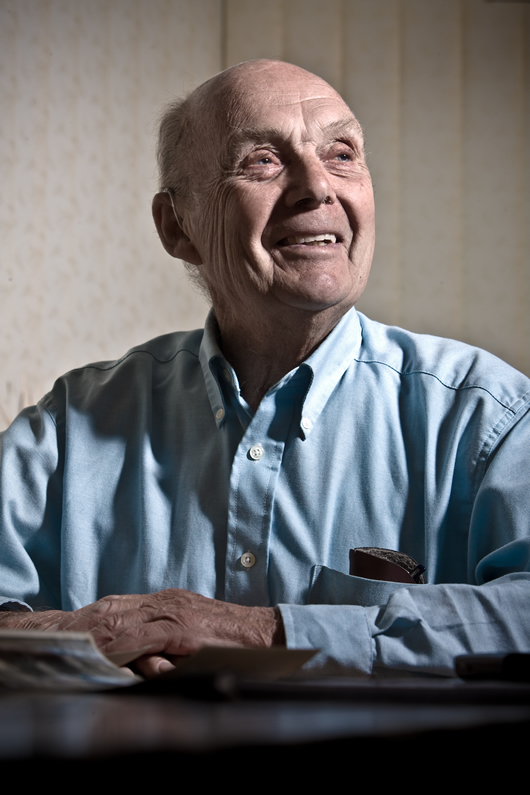
Only two of the Great Britain team got through the 1955 Tour. Tony Hoar was last, the Lanterne Rouge, but still an incredible performance, and Robinson finished 29th overall. With the great respect to Hoar, who defeated every rider who couldn’t finish, and the attrition rate of 1950s Tours was huge, the two results are a world apart.
Robinson wasn’t a plucky Brit battling through, he could do European bike racing. “I think I held my own in the mountains, but some of the guys were better on the flat. I can’t remember having a really bad day though, just not enough good ones,” he says with a little chuckle.
“I must have made some impression because I got 30 contracts for criteriums after the Tour, 30 contracts to do in 40 days. The only problem was I didn’t have a car. I got around Europe by train, by bike and by bus, living out of my haversack. A bit later some riders gave me lifts in their cars, and some even gave me a bed in their houses. Then because I didn’t have anywhere you could call a home, not since the start of the Tour de France, when the criteriums stopped in September I came back to Yorkshire.
“I was a builder so I took on some building work during the winter, but I decided I was going back to France. Raymond Louviot, an ex-rider who wanted to become a directeur sportif, had put together a group of guys who’d ride for any team in any race, which was allowed in those days. He wanted me to join them, so I agreed.
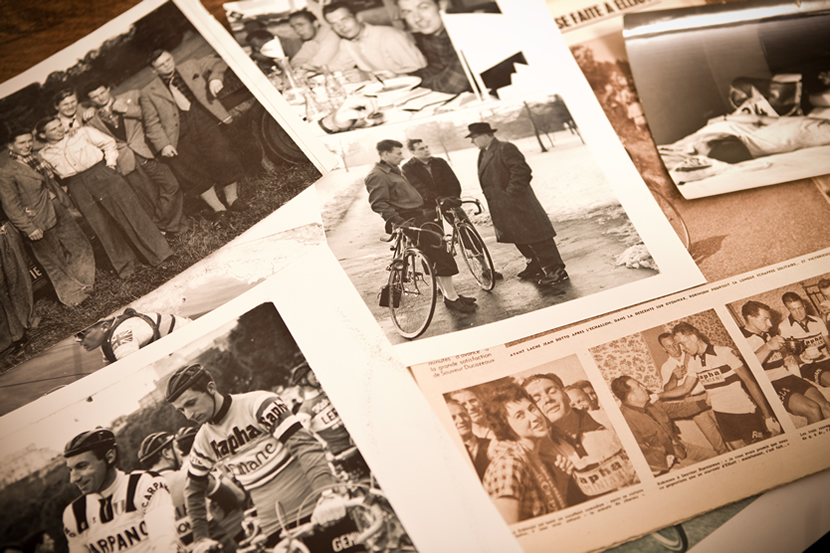
“Bernard Pusey, who’d been in the 1955 Tour team, wanted to give it another go as well. We hired a smaller bungalow near St Raphael, but when we got there everything was covered in three feet of snow, and it stayed for a month. It hadn’t snowed there for 30 years. We couldn’t ride, all we did was walk along the beach collecting wood to burn to keep us warm.
“We had no money coming in, only one contract to race in Algeria at the end of the month, which we kept but didn’t finish the race because we hadn't done any training. We got back to France with just enough to settle our bills and get back here to Yorkshire.”
Try again
A lesser spirit might have given up. Britain was a true island race back then, stranded between EU and Empire, so of course Robinson decided to go back.
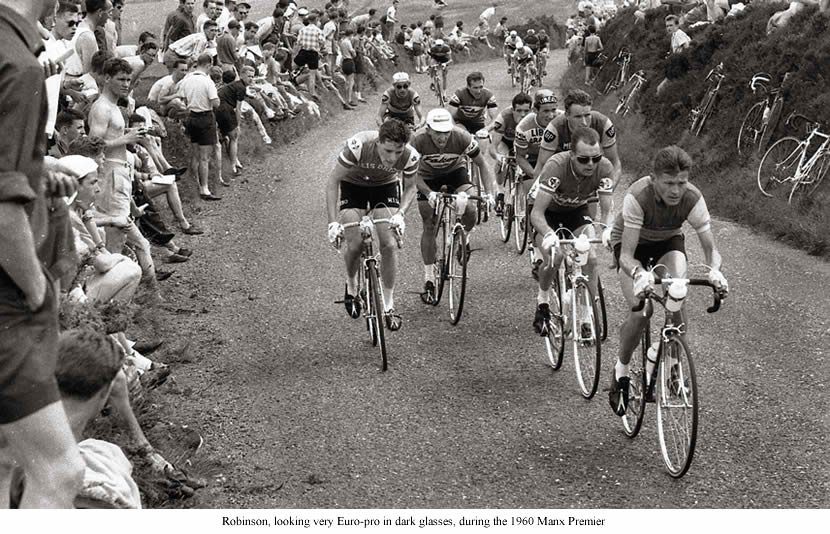
“I flogged the car, replenished the mental attitude if you like; one more try, let’s go back. I contacted Raymond Louviot and he got me in some races, enough to exist. Then I got a ride in the Tour of Spain, which started in April in those days, with Hugo Koblet’s team. Koblet didn’t finish, and I was best of the team in eighth place overall. I rode for Koblet’s team again in the Tour of Switzerland, and did well enough to get a full contract for the St Raphael team. And that was it, I was in.”
Robinson had made it, the first British rider to win a place in a top pro team, and St Raphael was one of the best. Of course he was still living in a caravan. “It was a good one though,” he points out, “And we parked it just behind Nice. My wife was with me, although she came home when I went to the Tour de France. It wasn’t so bad, a nice place to live really, we thoroughly enjoyed it.”
Robinson rode the 1956 Tour de France with a mixed team of riders from different countries, so it was no team at all really. But an intellegent self-contained rider like Ronbnson can flourish in an every man for himself is an environment. He finished the Tour in 14th overall.
“I came home in the winter and dug all the trenches for the place we live in now. I rode my bike at weekends and went back to France in January. With all that trench digging it took me about three weeks to get fit. That’s when I beat Louison Bobet to win my first big pro race, the Grand Prix de Nice.”
A few weeks later he was third in Milan-San Remo, the first British rider ever to stand on the podium of a monument, and only six other Brits have stood on one since.
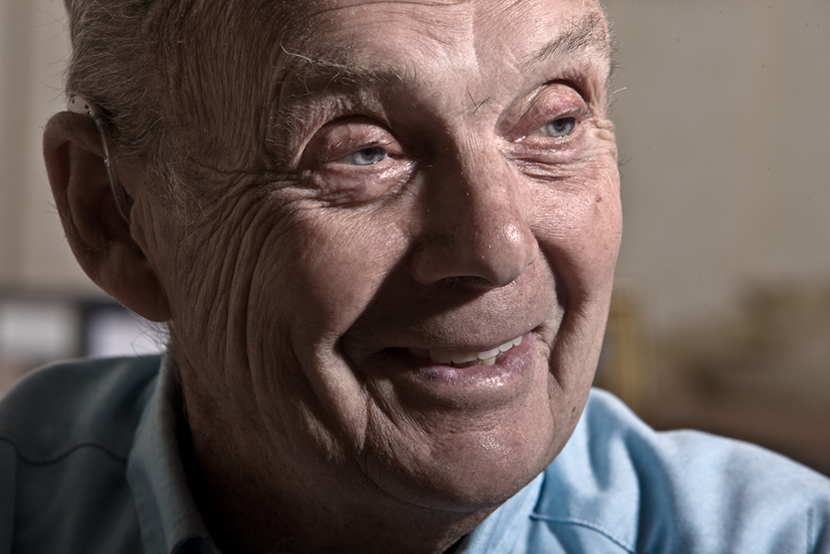
The way it works
It was a great ride, but Robinson knew how pro cycling worked by then. “Raymond Louviot was St Raphael's directeur sportif by then and told me to look after the Spaniard, Miguel Poblet if I could. Poblet wasn’t in our team, but Louviot wanted him to be, and he knew that Poblet had trained specifically for this Milan-San Remo. My team-mate Nicolas Baron got away towards the end, but he was caught on the Capo Berta, so I attacked.
“I led over the top, then I heard a shout from behind. It was Poblet, he was a few lengths behind me but there were only few others with him. He shouted for me to slow down, so I did. Maybe if it had been later I would have kept going, but there was a lot of flat roads after the Capo Berta so I wouldn’t have stayed away.
“Anyway, that left me in a break with Poblet and Fred De Bruyne, who’d won the previous year, and a rider called Schepens. We all got stuck in, and the break stayed away. I led out the sprint for Poblet and he and De Bruyne came past me, but they were both better sprinters than me, so they would have beaten me no matter how I did the sprint. Third was a good result for me, so I was happy. Louviot was happy too, and so was Poblet because he gave me a week’s holiday in his villa in Spain.”
You scratch my back and...... That was the way pro cycling worked back then. Robinson made his place in it by understanding the dynamics. He rode solidly in support of other St Raphael riders, winning for the team when the opportunity came, until he decided to stop at the end of 1962. “I had a place in the Peugeot-BP team for 1963, but by then we had children and my wife was back in Yorkshire bringing them up. It was where we wanted them to grow up but I was away from home a lot, and I decided that I’d done all I could in cycling.
“I’d travelled all over Europe, rode most of the big races. I loved racing in France and Italy the most, not Belgium though, at least not in Flanders with all the cobbles. I never got used to the noise when I raced, people shouting on either side of the road. I even did a six-day race on the track in Madison Square Gardens in New York.”
Robinson returned to life as a Yorkshire builder, “And I just got in with it. I kept in touch with cycling, and with some of the riders I raced with. I kept mementos, cuttings and some jerseys, the ones I’ve shown you today, and I rode my bike when I could. I never spoke much about my life as a professional cyclist, though, nobody wanted to know about it really. Then the Tour de France came to Yorkshire in 2014, and suddenly everybody wants to know,” he says, smiling shyly, and always a pleasure to listen to.
